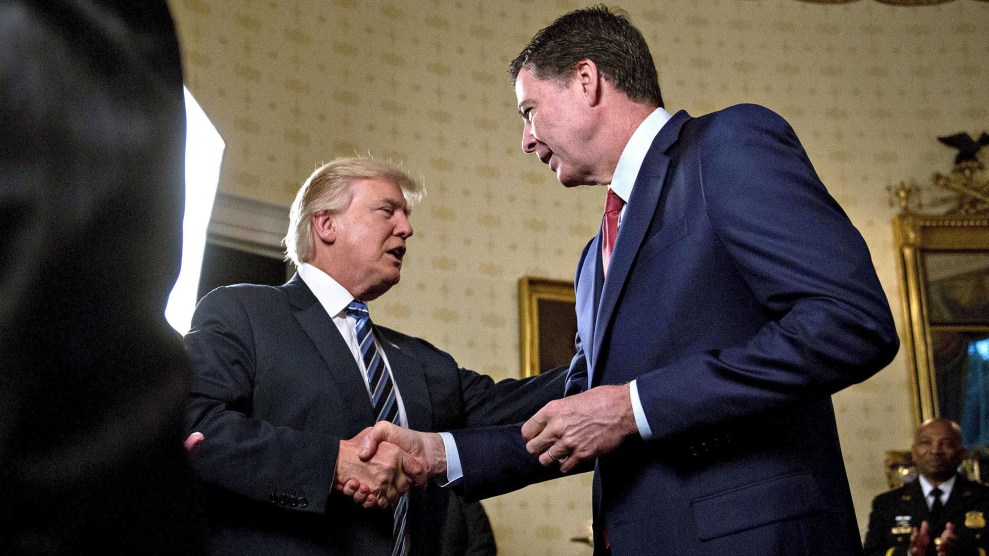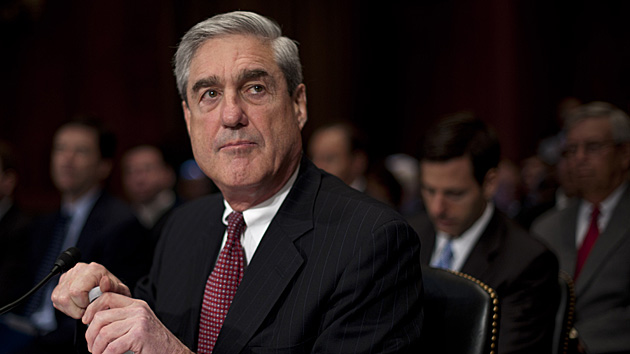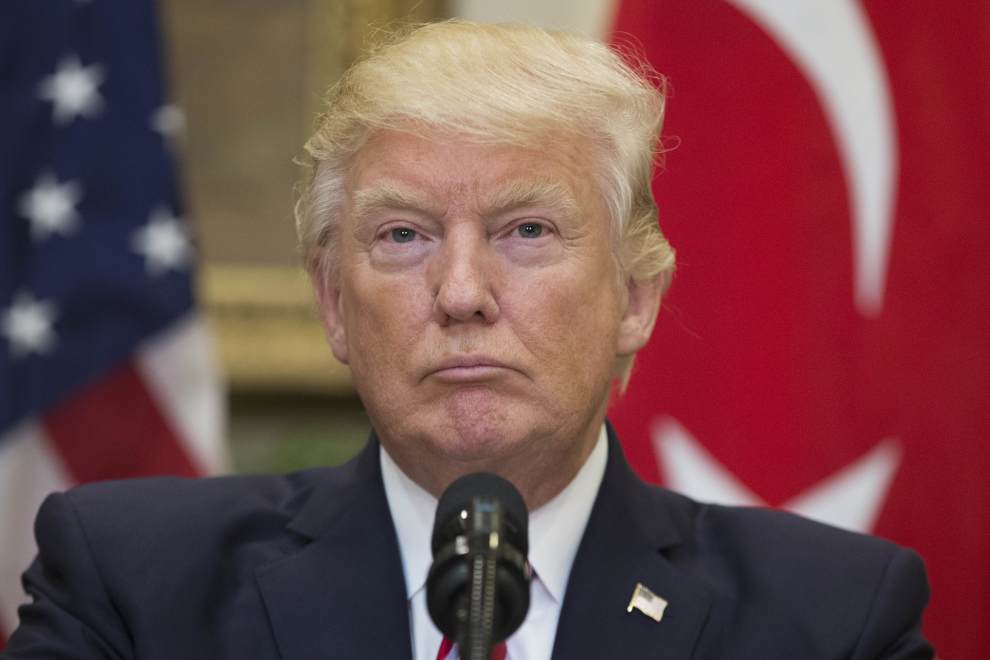
Rex Features/AP
When James Comey goes to Capitol Hill Thursday, he’ll tell the Senate intelligence committee that President Donald Trump asked him to drop any investigation into whether former National Security Adviser Michael Flynn made false statements to the FBI, according to Comey’s prepared statement. Comey, who was in charge of the bureau at the time, says he had no intention of complying with Trump’s request.
But the Flynn probe reportedly goes far beyond alleged false statements. It has now apparently been taken over by Robert Mueller, who was appointed as special counsel last month after Trump abruptly fired Comey. And that’s just one piece of what Mueller will be doing. As special counsel, he’ll oversee the widening federal investigation of Russian interference in the 2016 election and potential collusion between Trump campaign associates and the Kremlin—an investigation that Trump has called a “witch hunt.”
Moreover, Mueller won’t be alone. Half a dozen other entities in two branches of government are looking into aspects of the scandal. Here’s a breakdown of the ongoing investigations, who is conducting them, and what they might be looking at:
Law enforcement agencies
On March 20, Comey confirmed that the FBI “is investigating the Russian government’s efforts to interfere in the 2016 presidential election.” He said that the probe “includes investigating the nature of any links between individuals associated with the Trump campaign and the Russian government and whether there was any coordination between the campaign and Russia’s efforts.” Comey described the probe as a counterintelligence investigation that would also include an “assessment of whether any crimes were committed.” He added that he couldn’t reveal any additional information about “what we are doing and whose conduct we are examining.” According to Comey’s prepared testimony for Thursday’s hearing, he informed Trump that as of early April, the president himself was not “personally” under investigation. But various news reports citing unnamed sources have suggested that the FBI is looking into a number of Trump associates and their possible connections to Russian interests.
Jared Kushner. On May 25, the Washington Post and NBC reported that Kushner—Trump’s son-in-law and one of his closest advisers—had come under scrutiny from the FBI. A day later, the Post reported that according to intercepted Russian communications, Kushner had proposed to the Russian ambassador the establishment of a “secret and secure communications channel between Trump’s transition team and the Kremlin.” Jamie Gorelick, Kushner’s attorney, told the New York Times that Kushner didn’t recall the alleged conversations with the Russian ambassador. The Times cited anonymous sources as saying that Kushner’s actions “are under scrutiny as part of the investigation” but that Kushner “is not currently the subject of a criminal investigation.” Several days after that, the Times reported that FBI investigators were looking into a December meeting between Kushner and Sergey N. Gorkov, an associate of Russian President Vladimir Putin who runs a Russian bank that’s currently the target of US sanctions. The Times cited “current and former officials” who said the meeting “may have been part of an effort by Mr. Kushner to establish a direct line to Mr. Putin outside established diplomatic channels.”
Paul Manafort. Manafort is a long-time Trump friend who joined his presidential campaign in March 2016. He served as campaign chairman from May to August 2016, when he resigned amid reports that he may have received undisclosed cash payments from former pro-Russian Ukranian President Viktor Yanukovych—an accusation Manafort denied. The FBI, in conjunction with the Department of Justice’s National Security Division, is investigating Manafort’s communications and financial relationships with pro-Russian Ukranian politicians, according to the New York Times. In April, it was reported that Manafort would retroactively register as a foreign agent under the requirements of the Foreign Agents Registration Act (FARA) due to his past work on behalf of Ukraine. It’s unclear whether the FARA registrations are part of any ongoing investigation.
Federal (and state) investigators are also reportedly examining matters related to Manafort’s banking records real estate deals, but it’s unclear whether that has anything to do with the Trump-Russia investigation. According to the Associated Press, Treasury officials are looking into transactions Manafort conducted using a Cypriot bank—an investigation that pre-dates the Trump/Russia probe. (Cyprus has long been seen as a money-laundering hub.) The AP noted that in statement about the payments, Manafort “characterized them as a normal practice.”
On May 22, NBC News reported that Manafort had turned over documents that had been requested by the Senate intelligence committee. According to Manafort spokesman Jason Maloni, “Mr. Manafort has not been contacted by any authorities other than the United States Congress and officials responsible for FARA guidance, and he is cooperating with those inquiries.”
Michael Flynn. The disgraced former national security adviser was fired just 24 days into Trump’s term after the Washington Post reported that Flynn had lied to Vice President Mike Pence when he denied having discussed US sanctions with the Russian ambassador during the presidential transition period. Flynn reportedly made similar statements to FBI investigators, which could potentially be a crime. In his prepared testimony for Thursday’s hearing, Comey states that Trump asked him to “drop any investigation of Flynn in connection with false statements about his conversations with the Russian ambassador”—a request that Comey says he had no intention of honoring.
The FBI and DOJ are also reportedly investigating payments Flynn received from entities and business interests connected to Russia and Turkey. Flynn was paid $45,000 for attending a 2015 gala and conference for RT, a Russian state media organization. (About $11,000 of that payment went to Flynn’s booking agency.) He also was paid $530,000 last year by a Dutch company to work as a foreign agent for Turkish interests—but he didn’t register as a foreign agent. (Flynn retroactively registered in March, but it is illegal to be a foreign agent without filing with the DOJ.) Prosecutors have reportedly issued grand jury subpoenas to Flynn associates related to this work.
Flynn has asked Congress to grant him immunity in exchange for cooperating with congressional investigators, but the Senate intelligence committee reportedly turned down that request. Flynn’s lawyer did not respond to a request for comment.
Carter Page. Page, a low-level foreign policy adviser to the Trump campaign, has been on the FBI’s radar since 2013, when the agency discovered Russian spies were trying to recruit him. In the summer of 2016, according to the Washington Post, the FBI “obtained a secret court order” to monitor Page’s communications “after convincing a Foreign Intelligence Surveillance Court judge that there was probable cause to believe Page was acting as an agent of a foreign power, in this case Russia.” Page did not respond to a request for comment, but he has called allegations that he played any role in Russian meddling “completely false and misleading.”
Roger Stone. Stone is a self-proclaimed political “dirty trickster” who briefly served on Trump’s presidential campaign before becoming an informal adviser. In March, the New York Times reported that Stone had been drawn into the FBI investigation of possible collusion between Trump campaign associates and Russia. Stone claimed in August 2016 to have had back-channel communications with WikiLeaks founder Julian Assange. On October 1, 2016, he tweeted, “Wednesday@HillaryClinton is done. #Wikileaks.” Six days later, WikiLeaks began publishing Clinton campaign chairman John Podesta’s emails—emails that the US intelligence community concluded were stolen by hackers working with the Russian government. Stone didn’t reply to a request for comment, but he has denied participating in any collusion with Russia. “They can call me a dirty trickster,” he said during a May 11 television interview. “But there’s one trick that’s not in my bag: treason.”
It’s unclear whether Mueller will fold all of these threads into one massive investigation or whether he will decide that some fall outside his purview. Deputy Attorney General Rod Rosenstein’s memo announcing Mueller’s appointment said simply that Mueller’s investigation would include “any links and/or coordination between the Russian government and individuals associated with the campaign of President Donald Trump” and “any matters that arose or may arise directly from the investigation.” On June 2, however, Reuters reported that Mueller would also be taking over the investigation into Flynn’s work on behalf of Turkish interests, suggesting that Mueller may have a fairly expansive view of his authority.
In addition, as Politico notes, “Mueller’s mandate seems broad enough to capture matters like Trump’s alleged entreaties to Comey to end the inquiry into former National Security Adviser Michael Flynn.” If Mueller does investigate whether Trump’s interactions with, and subsequent firing of, Comey amounts to obstruction of justice, Rosenstein may have to recuse himself. That’s because Rosenstein, who Mueller now reports to, had conversations with Trump about Comey before the firing was announced, potentially making him a witness in the case.
Congressional committees
There are currently multiple probes underway in the US Senate:
The Senate Select Committee on Intelligence. The intel committee’s investigation was launched in order to provide the public with “a full understanding of the scope of Russian intelligence activities impacting the United States,” according to a January 13 statement from the committee. The scope of that review includes the US intelligence that went into producing the January 6 CIA/NSA/FBI assessment regarding Russian meddling in 2016 election; potential connections between Russia and people associated with US presidential campaigns; and Russian “active measures”—information warfare tactics—used to interfere with US politics. Comey will appear before the committee on Thursday to discuss his interactions with Trump.
On May 30, ABC News reported that the Senate investigation had expanded to include Michael Cohen, one of Trump’s personal attorneys. “I have been served with a subpoena and intend to fully comply,” Cohen told Mother Jones in a text message. “As to the sum and substance of the subpoena, I believe it is improper to discuss at this time.” Cohen also said that as of June 5, he had not been contacted by the FBI.
The committee has also issued subpoenas for documents to Manafort, Stone, and Flynn. Manafort and Stone have complied and turned over documents. On May 22, Flynn declined to provide documents, citing his Fifth Amendment right against self-incrimination; he subsequently agreed to provide some documents to the committee.
The Senate Judiciary Committee. The Judiciary Committee’s crime and terrorism subcommittee, chaired by Sen. Lindsey Graham (R-S.C.), is carrying out a lower-profile inquiry aimed at shining “a light on Russian activities to undermine democracy.” The subcommittee has asked for a briefing on Flynn’s firing. It has also requested transcripts of Flynn’s intercepted calls with the Russian ambassador and the FBI’s summaries of those calls.
The Senate Armed Services Committee. The Armed Services Committee has held two hearings on Russian hacking—one in January and one in May. But a committee spokesperson tells Mother Jones that the hearings were part of the committee’s normal oversight work and not part of any distinct investigation.
The House has its own ongoing investigations:
The House Permanent Select Committee on Intelligence. The House intel committee is looking at a number of questions: What were the cyber-related activities undertaken by the Russian government to meddle in the election? Did any of those activities include connections between Trump associates and the Russian government? What did the US government do about the Russian active measures, and what should it do going forward?
However, the Republicans who control the committee seem to be mostly interested in protecting the Trump administration from criticism; they’ve been particularly focused on investigating how information about Flynn’s actions and other aspects of the scandal was leaked to the press. The committee’s chairman, Rep. Devin Nunes (R-Calif.), was eventually forced to recuse himself from the investigation amid mounting criticism over his coordination with the White House.
Since Nunes stepped aside, the committee has requested documents and an interview from Michael Caputo, a communications adviser to the Trump campaign who has worked in Russia. Caputo denies participating in any collusion with the Russian government and has accused the House committee of smearing him. He declined to comment to Mother Jones.
On May 31, the committee issued subpoenas for records from Flynn and Cohen. That same day, Nunes—despite his recusal—issued his own subpoenas for information related to the “unmasking” of Trump associates whose identities appeared in US intelligence reports.
The House Committee on Oversight and Government Reform. The House oversight committee, currently chaired by Rep. Jason Chaffetz (R-Utah), is investigating aspects of the scandal. Chaffetz and Rep. Elijah Cummings (Md.), the ranking Democrat on the committee, have said that Flynn may have broken the law by not properly disclosing the payments he received from foreign interests associated with Russia and Turkey.
After the New York Times revealed that Comey had written a series of memos, including one alleging that Trump had asked him to shut down any FBI investigation of Flynn, Chaffetz quickly announced that he would subpoena those memos. Chaffetz has also asked the the Department of Justice’s inspector general to review Comey’s firing. Chaffetz is set to leave Congress at the end of June, paving the way for a new Republican—likely Rep. Trey Gowdy (S.C.)—to take charge of the committee. Gowdy led the House Benghazi hearings that hounded former Secretary of State Hillary Clinton.
The House Judiciary Committee. Democrats on the Judiciary Committee tried to force that committee to conduct its own review of Trump’s “conflicts of interest and alleged ties to Russia,” but Republicans blocked the effort.
One key question is how Mueller’s investigation will impact all these congressional inquiries. His appointment might complicate Congress’ work, according to Graham, who has argued that since Mueller may be conducting a criminal investigation, key witnesses would be less likely to cooperate with the congressional committees. “I think it pretty well at a minimum limits it, maybe just takes us out of the game,” Graham told reporters. Other lawmakers see it differently. “We have two very different missions,” Sen. Susan Collins (R-Maine), told MSNBC. “[Mueller] will focus on whether or not criminal charges are appropriate. We’re focused on counterintelligence policy. And we can impose sanctions on Russia. The special counsel can’t impose sanctions on Russia. So we still have an extremely important role to play.”
A key point to keep in mind: Whatever Mueller uncovers as part of his investigation may never become public, unless he secures an indictment—and even then, he would likely only release information directly relevant to the criminal case. The congressional investigative process, on the other hand, is designed to be as transparent as possible, giving the public its best chance to learn about what actually happened during the 2016 presidential election.
Inspectors general
Inspectors general in two separate departments are also conducting investigations that potentially relate to the Trump-Russia scandal:
The Department of Defense: The DOD Inspector General’s office informed Congress that as part of its own investigation into Flynn, it is examining whether he obtained sufficient approval “prior to receiving any emolument from a foreign government.” Presumably, the IG’s probe includes the payments Flynn received from Russian and Turkish interests. Cummings issued a statement on April 27, which included a letter showing that the Defense Intelligence Agency had warned Flynn in October 2014 that taking money from foreign governments could violate the Constitution’s emoluments clause.
The Department of Justice: As part of an investigation into Comey’s handling of the Hillary Clinton email case, the DOJ’s inspector general is looking into whether anyone within the FBI inappropriately leaked information about the Clinton investigation. Chaffetz has also asked the inspector general to investigate Comey’s firing, though it’s unclear whether that is happening.

















